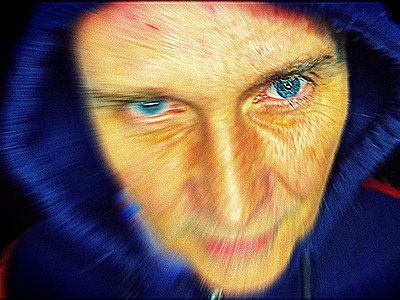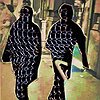Part 1
Name: JP Rossi
Nationality: French
Current release: JP Rossi teams up with Markus Reuter for Mumblecore Failure, out now under their new duo moniker ReuteRRossi.
Recommendations: So many. My recommendation would be more “have appetite for art”, whatever art would mean for you. Go for the obvious, the well-known, the “classical”, it is generally quite deep and rich to delve into.
But OK, if we talk about music, I’d go to the boss. I mean Johann-Sebastian Bach. St John’s Passion, maybe?
I am not so much of a knower of the other arts to recommend, but hey, for the sake of the exercise: I have a weakness for Lucian Freud, Francis Bacon, Antoni Gaudi (go to Barcelona if you can!) … That is just in this moment.
For books, I tend to read more essays and philosophy. Why not try Memories, Dreams, Reflections by C.G. Jung for instance.
And in line with what we were discussing, a great work of art: the Grand Canyon! Just a thought.
[Read our Markus Reuter interview]
When I listen to music, I see shapes, objects and colours. What happens in your body when you're listening? Do you listen with your eyes open or closed?
Well the short answer is: it depends. Music brings all kinds of experiences I guess, and that’s what makes it so complete – at least for me.
I see music as a form of art that is received with the whole body, much more than any other art (I do not mean practicing of course, otherwise dancing is an obvious one). By nature, the airwaves move and touch your body through your ears and your skin.
And of course, music also touches your soul. When I listen to “Behind the lines” by Genesis, for example, or to appealing dance music, I want it loud, I stand up, I beat the air and I am in full awareness of my immediate environment. No colours or shapes here, just plain energy.
When I relax and listen to any Brian Eno piece, I close my eyes and follow wherever the sound takes me too, and in this case, yes, it can well be shapes and colours, or even complete landscapes as suggested by On Land or Apollo.
Or a total epiphany with tears and joy beyond all this, as can happen from time to time. I remember a very strong one listening to “The German Requiem”
Entering new worlds and escapism through music have always exerted a very strong pull on me. What do you think you are drawn to most when it comes to listening to and creating music?
Definitely. It’s like navigating in a new world, either free of all constraints, or extremely full of constraints (like in “maximalist” pieces a la Paul Dolden, or some mathcore experiences like The Dillinger Escape Plan can provide very efficiently).
When creating music, the process is slightly different, as I am in a position of a God, apparently deciding for all what’s going to happen, eventually only deciding that I am going to let things happen and live with them.
That process creates “an abandonment of consciousness” into me; I mean, I start something with an idea that I have, or more often a music that I dreamt of, trying to make it happen in the “real world”; but in all truth it has happened already.
What I end up with is slightly or sometimes drastically different. I have little clue of how this difference came about. It is a mystery and I give in to this mystery with delight, since it is a provider of hope, and faith.
What were your very first steps in music like and how would you rate the gains made through experience?
My mother’s family is composed of all classical music players, and I always listened to music. My first musical memories are stories that I listened to on a small disc player in the early seventies.
No exactly “Peter and the Wolf” but rather stories like radio plays, with strange voices, noises and electro-acoustic illustrations and some melodies to accompany, to make those suitable for young children. Maybe that has created in me a strong appetence to tell stories.
Then there was Mozart, Beethoven … and Ennio Morricone (we had a record of the spaghetti western soundtracks). Still storytelling. Then it was 1976 and Oxygene arrived, and with it I discovered all the synthesizer music of the time. I was 11 and I didn’t want to hear anything else than synths, as the rest of the instruments seemed too “real” for me. I wanted to escape, and this music was just the perfect means:
Jarre, but soon also Vangelis, Tangerine Dream and a bunch of fairly unknown records I managed to find – sometimes with great efforts. Travelling into the unknown. I would apply that to music creation later on.
[Read our Jean-Michel Jarre interview]
[Read our Tangerine Dream interview]
Then I discovered Genesis, and, as they say, it was a “revelation”. Progressive music was again telling stories.
[Read our Steve Hackett of Genesis interview]
I finally arrived at the rebel age, and when I heard Remain in Light by Talking Heads and Closer by Joy Division, I realized that playing only one chord, with no apparent change whatsoever, could actually be fascinating, just like a painting. I could admire for one minute, or one hour. And in the early eighties, Discipline by King Crimson offered the perfect synthesis of all the above.
And finally I was a late discoverer of the freedom of jazz. Those were the movements of my soul that I see as “gains” that made me grow, not only in my practice of music but in my perception of life.
Playing music, first piano and electric organ, also taught me to improvise, to let go, and later on as an adolescent I was imagining and recording all sorts of very strange rebellious songs and pieces, adding screams and weird noises to those instruments. Trying to blend improvisation and advanced composition in the same movement.
According to scientific studies, we make our deepest and most incisive musical experiences between the ages of 13-16. What did music mean to you at that age and what’s changed since then?
Well, I partially answered this above. At this age music was a big chunk, if not the major part of my life. That represented my main interest when I was alone or with my friends, listening and soon composing music that I ended up recording on an old magnetic tape recorder left by my father. You could record the right channel first and then the left, that was a start!
What’s changed since then? I do not need to extend on how the way of listening to music changed in the world, the way of doing music changed etc, many existing sources would answer this with plenty of details and ideas. In some way those changes had a major impact me like anyone else. I am not listening to one song (or one album) continuously for days and days like I used to when I had just bought a new vinyl. There is so much available, so much more to discover now.
This has made me probably a bit more superficial than I was. At the same time, I think I understand music better, so I am able to enjoy quicker. Maybe I compensate this shallowness by elaborating my own pieces. There I listen and listen again to the same stuff, dig deep into it, change minor things, go back to it endlessly.
I could say “Making music today covers in full the way I used to listen to music yesterday”. One could conclude that I am mostly making music for my listening satisfaction.
How would you describe your own relationship with your instrument, tools or equipment?
That’s what they are: tools, equipment. I do not have a particular bond with any of them. I do not take too much care or them, I’m afraid. The place where I work is not specially well arranged. Most of what happens, happens inside.
I am not proficient in any instrument so I can’t claim that I have a particular symbiosis with an instrument. There is special case though: the computer (and its apps). It safeguards my memory, provides huge flexibility and possibilities to materialize my imagination etc. Not as an object though, but as a potential. I am attached to keeping (and enhancing) that potential. And in my best fantasies, my “instruments” are the musicians.
The “instrument” is not an object but rather a way to achieve something. What could be more intriguing, thrilling, than using an “instrument” that is taking you beyond what you thought its use would be? Towards what the music wants to express - and it’s a leap of faith too.
Where does the impulse to create something come from for you? What role do often-quoted sources of inspiration like dreams, other forms of art, personal relationships, politics etc play?
Dreams, most often. I am trying to put something unexpected, unconscious, to life. If I hear something coming from the inside and I find it interesting, there may be chances that its interesting quality is a true fact (a reality).
Another way of making music happen is by letting go through the process - as I described above.
A third way is to interact with other musicians who have no pre-conceived ideas, say, who have a “similar approach”? In that field, I am extremely grateful to have Markus Reuter’s attention, and some of his good friends and fellow musicians. I need to mention Trey Gunn who is the most relaxed musical chap ever! I learn musicianship from these guys every day.






